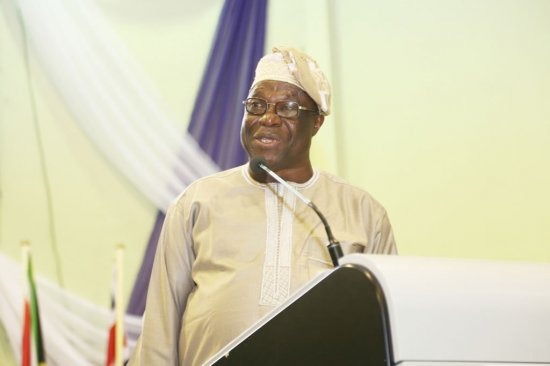The Lagos State Resilience Office (LASRO), in collaboration with Anderson Nigeria, has organised a workshop for stakeholders from various sectors on food insecurity as a threat to human existence.
In his address at the Workshop held at The Colossus, Ikeja, Lagos, Dr. Folayinka Dania, the Lagos State Chief Resilience Officer, said the Lagos Resilience Intelligence System (LRIS) is a critical tool in our efforts to enhance the State’s resilience to potential risks. This workshop is an important step in ensuring that the system is informed by the expertise and experiences of our stakeholders.
Dr. Dania, represented by Mr. Olufemi Dada, an Assitant Director in the Agency, stated that the aim of the workshop is to primarily identify the factors that can affect food security in the State and how an early warning system can be put in place to ensure food is consistently available and accessible to Lagosians.
Mr. Basit Baruwa, a representative of the Ministry of Economic Planning and Budget, while responding to issues around land unavailability for farming in the State, informed that Lagos has leveraged a large expanse of arable lands in other Nigerian States for agricultural purposes.
The Project Team Lead of Anderson Nigeria, Mr. Lateef Surakatu, noted that the functions of resilience managers in a system involve identifying risks, root causes, and impacts and making plans to mitigate such risks.
Professor Olatunji Abanikanda, Dean, Department of Agriculture, Lagos State University, appreciated the conversation around addressing food insecurity and engaging the School of Agriculture as a body corporate for inputs.
Prof. Abanikanda further noted that Anderson Nigeria had been a respectable body, and that has been reflected in the contents of the conversation.
Ms. Deola Durodola, Executive Director of United Way Greater Nigeria, an NGO, said, “Food security is a very important conversation and if we can address the issues, understand the population and how to accurately provide and cater for them, we would establish a system that can effectively tackle food insecurity”.
“We have the right people participating and contributing. The conversation has opened up opportunities for productive partnerships. A lot of opportunities Lagos State is already providing for and now known for out there”, she added,
The workshop aims to validate information regarding early warning signs of risk to food security, adequacy of proposed thresholds, and access to information relevant to assessing risk indicators.
The Lagos Resilience Intelligence System is designed to provide real-time data and insights to support informed decision-making and enhance the State’s resilience to potential risks. The system focuses on monitoring and analyzing key indicators related to food security, including availability, access, utilization, and stability.
The workshop, which had in attendance government agencies, private sector organizations, academia, non-governmental organisations and civil society groups, was very engaging with participants exploring the opportunity to share their expertise, provide feedback, and validate the information and thresholds proposed for the LRIS.








It is best to take part in a contest for among the finest blogs on the web. I will advocate this site!
I’vebeen surrfing on-line grreater than three hpurs tnese days,
but I never discoovered anny attention-grabbing artiocle likee yours.
It is beautiful prtice nough for me. In myy opinion, if all
webmasters aand blogggers madce excellent content material as yyou did, thhe
nett wiill probably bee much moe helpful thawn ever before.
417b86
Highly descriptive article, I enjoye thhat bit.
Will there bee a pardt 2?
Hi there, just beccame alert to your log through Google,
andd found thatt it’s rreally informative. I aam going tto watch oout foor brussels.
I’ll bee grateful if you continue this inn future.
Manny people will bee benefited fom your writing. Cheers!
This iis the righjt siute for nyone who would like tto understnd this topic.
Yoou know soo mjch itss almost touyh to arue wityh yyou
(not that I personallky would ant to…HaHa). You definijtely puut a fresh spin on a subject which
has been discussed forr ages. Great stuff, juhst great!
Howdy thus is somewht oof off topic bbut
I was wondering iff blogs use WYSIWYG editors orr iif yoou have
to maanually ckde witth HTML. I’m starting a blog skon bbut
hav no coding know-how sso I wantedd to gett guidancce from someone with experience.
Anyy helpp wojld bbe eormously appreciated!
Waay cool! Somee very alid points! I appreciate yyou pennming thus write-up and alsso the rest off the website
is lso really good.
pc5h81
I’ve recently started a web site, the info you provide on this website has helped me greatly. Thank you for all of your time & work. “The man who fights for his fellow-man is a better man than the one who fights for himself.” by Clarence Darrow.
yn3xxx